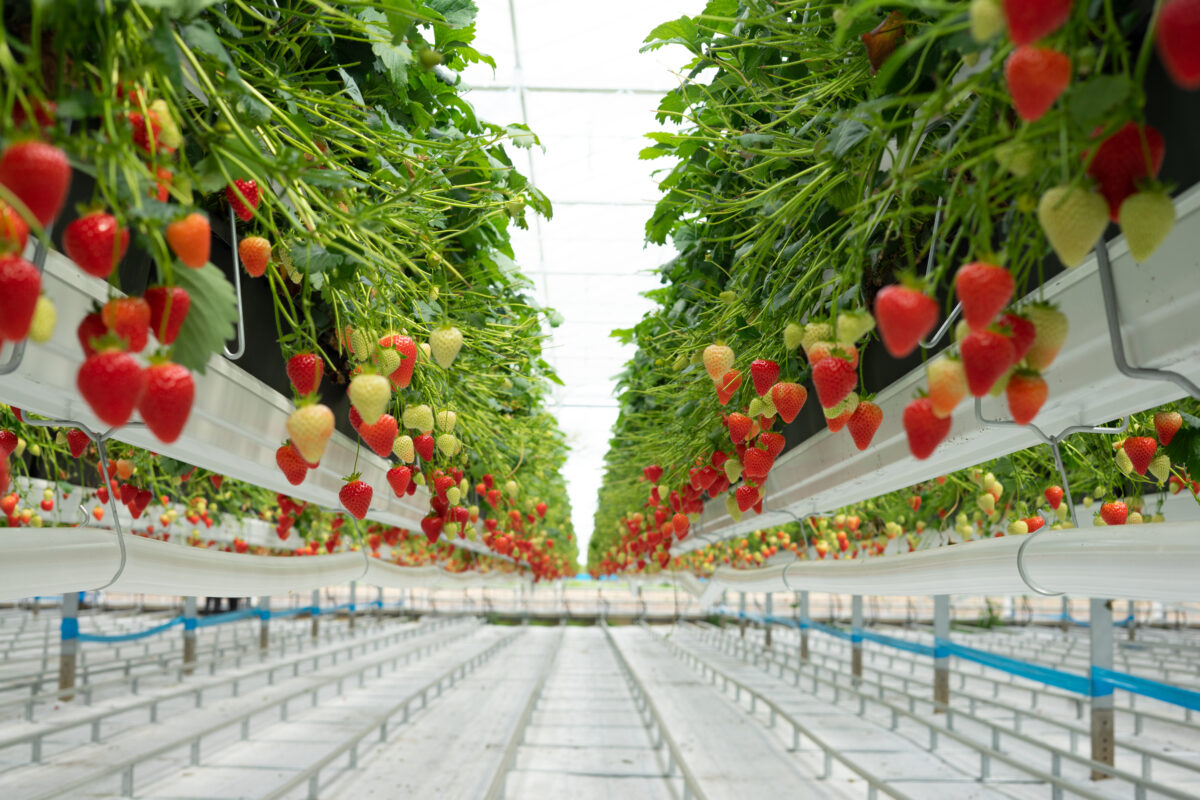Dyson Farming’s strawberries: as the first crop ends, a new one begins…
Dyson Farming’s strawberries: as the first crop ends, a new one begins...
The first harvest of Dyson Farming’s strawberry crop, grown in the 15-acre glasshouse in Carrington, is now complete. During the 5-month long harvest, we produced and sold 470 tonnes of strawberries (approximately 23 million berries!).
The meticulous care and attention to the crop by the team has enabled us to produce delicious strawberries which have been sold across the country.
How it began
The strawberry glasshouse journey began in 2020, with the planning and construction of the 15-acre glasshouse. It has been an amazing journey since then, growing quality strawberries at scale, out of season, and in a sustainable way.
The concept of sustainable strawberry production came about when we challenged ourselves to come up with the best way of using the excess heat that was being produced from our renewable energy operation. Rather than waste this heat, the glasshouse, which now sits adjacent to the anaerobic digester, captures and uses the heat to sustainably produce strawberries at a time of year when outside temperatures are too cold. You can find more information about how the glasshouse works here.
Dyson Farming Glasshouse Manager, Angel Angelov, reflects on the early days:
“Despite my many years of experience in this field, we had a bit of a challenging start. We needed to build a new team that was capable of learning to work together in a short space of time. Fortunately, the team very quickly settled into their roles and understood what the expectations were. Within the first two to three weeks of the picking season, we had formed hard-working, efficient teams in both the glasshouse and packhouse.”
It is all about the quality
We have been working closely with national retailers, local farm shops and restaurants to sell our strawberries. It is a testament to the team that the quality of the Malling Centenary variety was such that it achieved Marks and Spencer’s top tier approval, Red Diamond Label, and was clearly identifiable in stores with the Dyson Farming logo displayed on the packaging.
What has made our first season particularly rewarding has been the positive feedback from those who have bought and tasted our strawberries. We actively encourage people to take an interest in how we farm and with the strawberries, people have taken the time to contact us directly with their opinions, complimenting us on their taste, colour, shape and consistency.
We take great pride in producing the best possible quality products and this positive feedback will continue to motivate the team going into the autumn season when our second crop of strawberries will be available.
Moving on to the autumn crop
In preparation for the autumn crop, the hard work continues. Within 3 weeks the team will remove the old crop and thoroughly clean the glasshouse, all growing troughs and irrigation lines in preparation for planting 700,000 new strawberry plants for the autumn season.
The autumn season will also bring with it new challenges compared to the summer season as relatively warm nights and longer days in August will affect the eventual sugar levels in the strawberries. There is a lot of competition for the sugars produced by the plants, and if the growing conditions are not right, not enough sugars are built up in the final berries.
To prevent this from happening and to ensure top quality is achieved, shading screens have been installed to help control the sunlight, extra CO2 is applied, and plant food recipes are carefully adjusted to feed the plants through the 60,000 metres of irrigation pipes. The team will be taking it very steady, using all their knowledge and expertise to ensure the plants are not put under any undue stress which could affect the quality and yield.
Following the success of the first crop, the second crop of Dyson Farming’s strawberries will be ripe and ready to eat by the end of September.
What about the future?
Angel Angelov explains:
“Whilst our focus remains on producing top-quality strawberries, we are also determined to keep looking to the future and continuing to innovate. This might include expanding the glasshouse and packhouse facility, growing new fruit varieties, developing robotics for the glasshouse operation or installing growing LED lights to extend the season further over the winter period (December, January and February). We have got off to a good start and I am very excited about what the future has in store.”
The Estate Office,
Cyclone Way, Nocton,
Lincoln LN4 2GR
